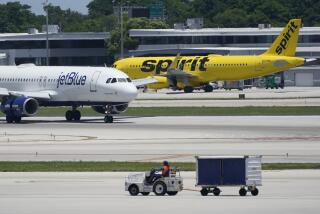Deregulation Has Trimmed Number of Airlines
- Share via
The U.S. government deregulated the airline industry, it said, to unleash competitive market forces that would benefit the traveling public.
There were those who warned that the main thing that deregulation would encourage was mergers among carriers. Eventually, they said, we’d be down to a handful of airlines. And then where would the competitive forces come from, they asked.
Well, we’re not down to a handful yet. But we’re working on it.
Throughout the seven-plus years of deregulation, there have been mergers, some friendly, some not. The action has become especially hectic in the last year.
The ink was hardly dry on President Carter’s signature on the deregulation bill when we had the first airline consolidation. North Central and Southern Airways combined to become Republic, later to gobble up Hughes Airwest as well.
Pan Am took over National. Texas Air (actually a holding company rather than an airline) moved in on Continental and, after a bitter fight, won control and spliced its Texas International into the Continental network.
Airline Spending
Just in the last year, airlines have spent more than a billion dollars buying other airlines or pieces of others. And there’s another $2 billion that needs only Department of Transportation approval before it, too, is spent.
First, United slipped Pan Am a cool $750 million for its Pacific route system. No more Pacific Pan Am service.
Then People Express and Texas Air got embroiled in a battle to take over Denver-based Frontier. After a brief battle, People Express got the prize . . . at a cost of $300 million.
Another merger was completed between Piedmont and the regional carrier, Empire Airways. The price--$42 million.
If the green light is given, Northwest will write a check for $884 million to take over Republic; Texas Air, acquisitive as ever, will fork over $700 million for Eastern, and TWA, looking to boost its passenger flow from interior U.S. points, will get itself St. Louis-based Ozark for $240 million.
The Northwest/Republic merger illustrates how many airlines can dwindle down to a precious few. Seven years ago, we had four airlines . . . North Central, Southern, Hughes Airwest and Northwest. Now we have Northwest.
North Central? Southern? Hughes? Gone, all gone. First into Republic and now into Northwest.
Some of the merged airlines may keep their own identities. Texas Air, for example, has said that Eastern will continue to operate as a separate entity. Frontier is still Frontier. Ozark may remain Ozark.
But these carriers can hardly be considered independent companies.
The bottom line is that a merged airline, whether it keeps its own name or not, has to hew to the line dictated by its new master. So what we have, in effect, is reduced potential for competition, rather than increased.
Having said all that, statistics show that prices in some markets tend to be lower today than they were before deregulation, and that service frequencies have increased in 38 of the 48 mainland states.
Since deregulation, new entrant carriers have come in droves and have departed in almost like numbers. They have created the kind of downward pricing pressure that the law was designed to create.
Many Undercapitalized
But, many of them are under-capitalized, badly managed, less than totally reliable.
In the long haul, the real survivors will be the very big, very strong, established airlines, or those, perhaps, who get that way by merging with, or taking over, other carriers.
United, for instance, with its 50-state domestic feed and, now, Pan Am’s Pacific service, has become a veritable behemoth, whereas before it was only a giant. TWA/Ozark becomes a major player in some parts of the country, far in excess of what either of them could do alone.
Merger mania is not restricted to the big three or four of the industry. Western, back in the black after several losing years, is said to be a prime target for a number of merger-hungry airlines. Delta is anxious to acquire it, especially since the Continental/Eastern consolidation.
USAir, Alaska Airlines and Aloha have been the subject of merger speculation in recent months.
If mergers and consolidations of independent airlines continue at the present pace, it won’t be too long before we find ourselves where the anti-deregulationists said we’d eventually be--with a handful of airlines wielding all the power.
More to Read
Inside the business of entertainment
The Wide Shot brings you news, analysis and insights on everything from streaming wars to production — and what it all means for the future.
You may occasionally receive promotional content from the Los Angeles Times.










